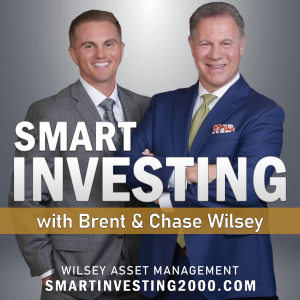
Smart Investing with Brent & Chase Wilsey
Business:Investing

July 1, 2023 | Inflation, Recession, Rate of Return, Short Sells and Estimating your Retirement Income
 2023-07-05
2023-07-05
Inflation
The Fed's preferred gauge for inflation, the Personal Consumption Expenditures (PCE) price index, showed inflation is continuing to cool. The headline number came in at 3.8%, which is below last month's reading of 4.3% and well below last May's reading of 6.5%. This was the lowest rate we have seen since April 2021. Food prices have remained high and climbed 5.8% compared to last year, but energy prices have fallen dramatically as they declined 13.4% over the same time period. With consumers still spending in the service economy, prices in the service sector increased 5.3% while the prices for goods were up only 1.1%. Core PCE, which excludes food and energy, may have disappointed some people as it remained at 4.6%. So far this year, Core PCE has registered a reading of either 4.6% or 4.7% in every report. I continue to believe that both these rates will head lower as we exit the year. Although the Fed has indicated two more rate increases, I believe they should continue to hold rates steady as inflation looks to be pulling back due to the actions that were previously implemented.
Recession
You may be waiting for the other shoe to drop and then bam we have a Recession; but I constantly see data that contradicts any chance of a major recession. 10 years ago, the annual manufacturing construction and outlay was roughly $50 billion. That’s a lot of money. Would you have guessed for 2023 that is going to be nearly 4 times that number at $200 billion? In 2020 foreign direct investment in the US was $150 billion and in 2023 it is more than double that amount coming in at $350 billion. Look around the country and you will see major construction on airports, highways, electric vehicles, and battery charging stations. I’m sure you could add a few to this list as well. Are we going to have a major Recession? I don’t see how.
Rate of Return
How is that a 20% return can be better than a 100% return? It is based on the concentration of the portfolio. Many times, I hear people discuss how happy they are with the winners in their portfolio but come to find out they might only make up 1% of the entire portfolio. When we buy companies at Wilsey Asset Management, we start with a 6% investment as we have spent hours researching the company and feel very comfortable with it. A 20% return with a 6% allocation would produce a 1.2% overall benefit to your portfolio versus a 100% return with a 1% allocation would produce an overall benefit of 1%. I would rather understand the investments in my portfolio than take a chance on several businesses I know very little about.
Short Sells
Short selling is when an investor is betting the price of a stock will drop. There’s currently about $1 trillion of short interest as those investors speculate the market will turn and head lower. The gain in the market has caused a paper loss for these short sellers of around $120 B this year. One of two things will happen. The stocks will turn around and drop and the shorts will profit, or the shorts will have to come in and cover themselves by buying the stock which will put upward pressure on stock prices. Based on valuations, I believe the short sellers will continue to be patient and wait for the drop.
More Episodes
Create your
podcast in
minutes
- Full-featured podcast site
- Unlimited storage and bandwidth
- Comprehensive podcast stats
- Distribute to Apple Podcasts, Spotify, and more
- Make money with your podcast
It is Free
- Privacy Policy
- Cookie Policy
- Terms of Use
- Consent Preferences
- Copyright © 2015-2024 Podbean.com





